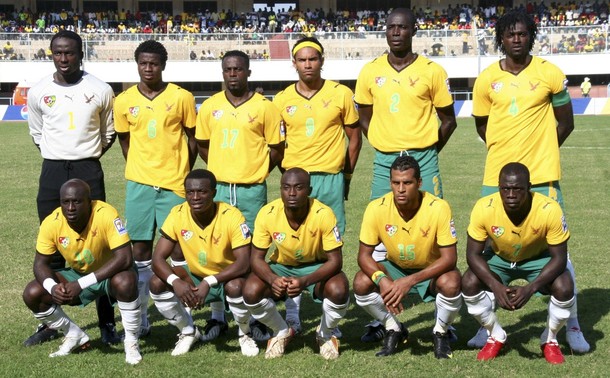
The intersection of oil and football has moved from a field in Fallujah to a Cabinda-Congo border crossing, where earlier today separatist rebels ambushed the Togolese team bus.
Terrified Togolese footballers told of how they dived to the deck of the bus as they were “machine-gunned like dogs”. The Angolan bus driver was killed and four others on the bus were wounded including the reserve goalkeeper, Kodjovi Obilale (pictured in the Togo team photo above), and young midfield prospect, Serge Gakpé.
Les Eperviers are in state of shock and soundings taken from the players suggest they are unlikely to fulfill their fixtures. Togo are scheduled to open their tournament against Ghana in Cabinda on Monday.
You can expect a flurry of charges of corruption and references to atrocities dating all the way back to Berlin conference of 1884 (which set the borders for present day Angola, a year after Portuguese occupation of Cabinda).
No doubt the oil emirs and oligarchs who control the heights of English football will feel empowered to pipe up and demand the Africans return their human “property”. I fear there are probably no players of the calibre of Obdulia Varela around to respond. I wonder what the great Uruguayan captain would make of being told to return to the ranch to drive a Range Rover around the Stamford Bridge Ice Rink for the viewers at home? It will be interesting to see how Michael Essien and Didier Drogba respond tomorrow to the prospect of playing their 1st round fixtures in the Angolan enclave that is home to between 60% to 70% of Angola’s oil.
The tournament will go on with or without Togo, but an excuse may have to be found for Cabinda. It is now again as it once always was in Angola: “Confusão”. If only the great Kapuściński were still alive. He might be tweeting from his android in rebel territory.
Emanuel Abebayor when interviewed by Andy Hunter of The Guardian in the days before he departed for tournament was fearless, as ever, “Some people might be afraid, which is normal, I can understand that. But I’m going back to Africa, to one of the countries on my continent, and I’m prepared for Cabinda. I will enjoy myself. African nations are getting better and better. Angola had a big, big war but today everybody is getting along better. They have good organisation and we hope everyone will enjoy it and come back safely.”
Our thoughts are with the family of the Angolan bus driver.
Categories
3 replies on “Guns, Oil and Football”
While it is all good and well to be fearless, these are the kind of problems and negative press that the African continent does not need – especially in the year in which we are attracting international teams to come and play the soccer world cup here.
There is s still a lot of negative perceptions and lumping together of “Africa” into a single basket. While South Africa is not Angola, it gives ammunition to those German security consultants who advised all their players to wear bullet proof vests outside of their hotel room.
A similar thing happened to the Sri Lankan (?) cricket team in Pakistan about 18 months back and they haven’t been able to get international teams back to support them and play fixtures there. People have long memories.
Lots of print and broadcast coverage in SA media here about how Angola is NOT South Africa, and how 2010 is a whole different ball game from the African Nations Cup.
Mark Gleeson’s insights here:
http://www.mg.co.za/article/2010-01-09-you-cannot-compare-angola-with-sa
(Note how Local Organizing Committee official essentially blamed Togo for the attack!)
Sample of global media resonance:
http://www.nytimes.com/2010/01/09/world/africa/09angola.html
I just think it is such a pointless exercise.
A lot of international businesses perceive Africa as being a violent place where the rule of law counts for nothing. It discourages them from making further investments in the continent and incidents like these just re-inforce this opinion.
Bloody frustrating!